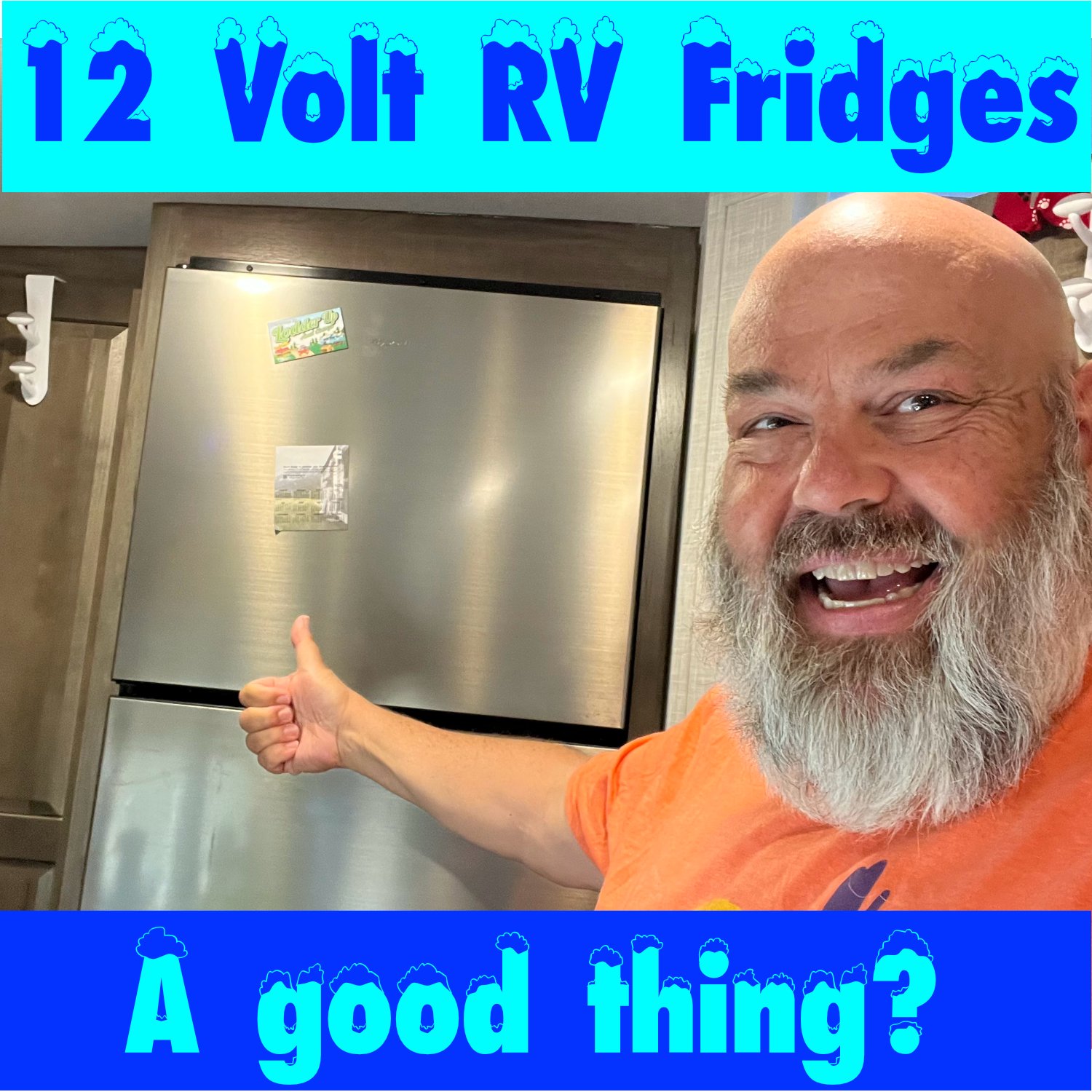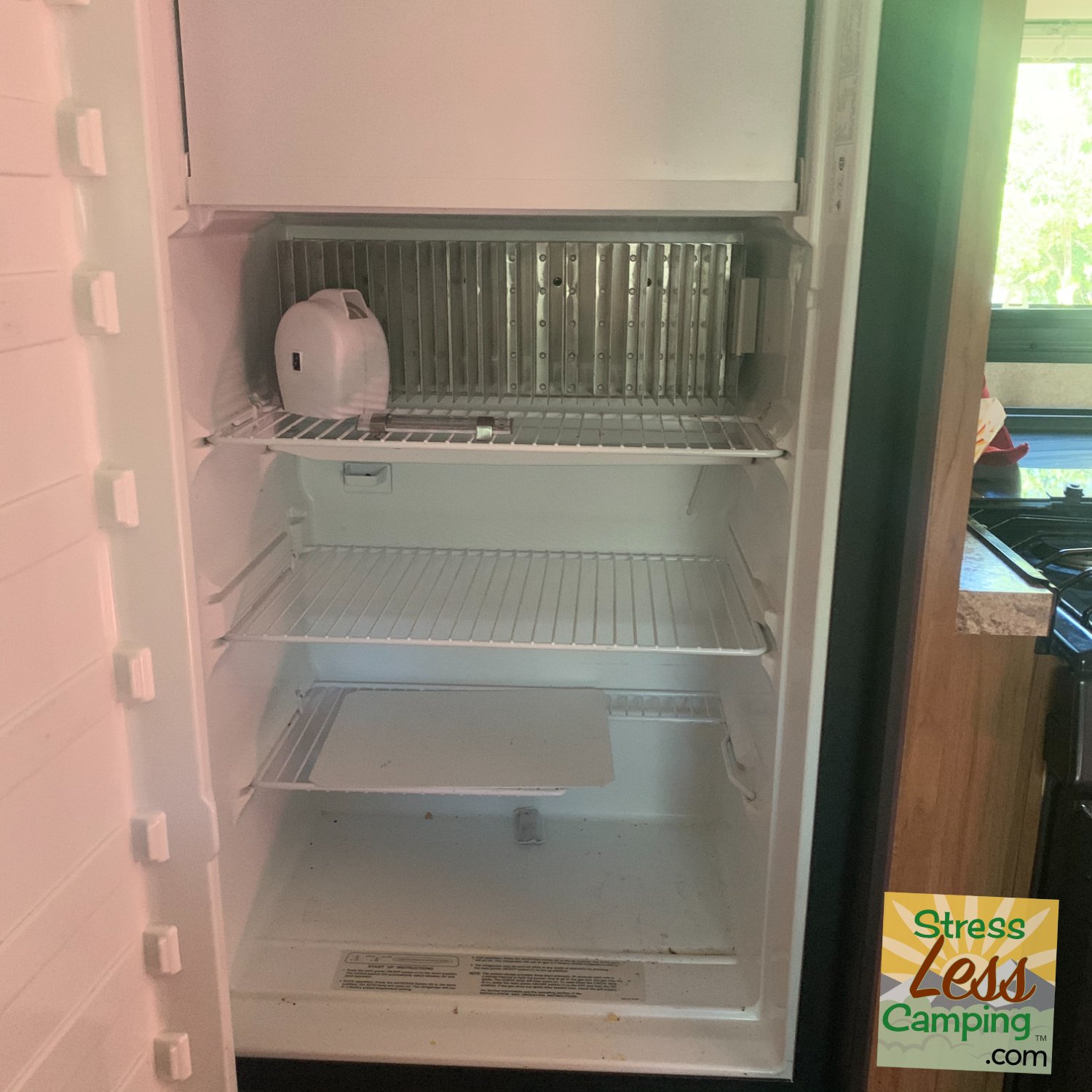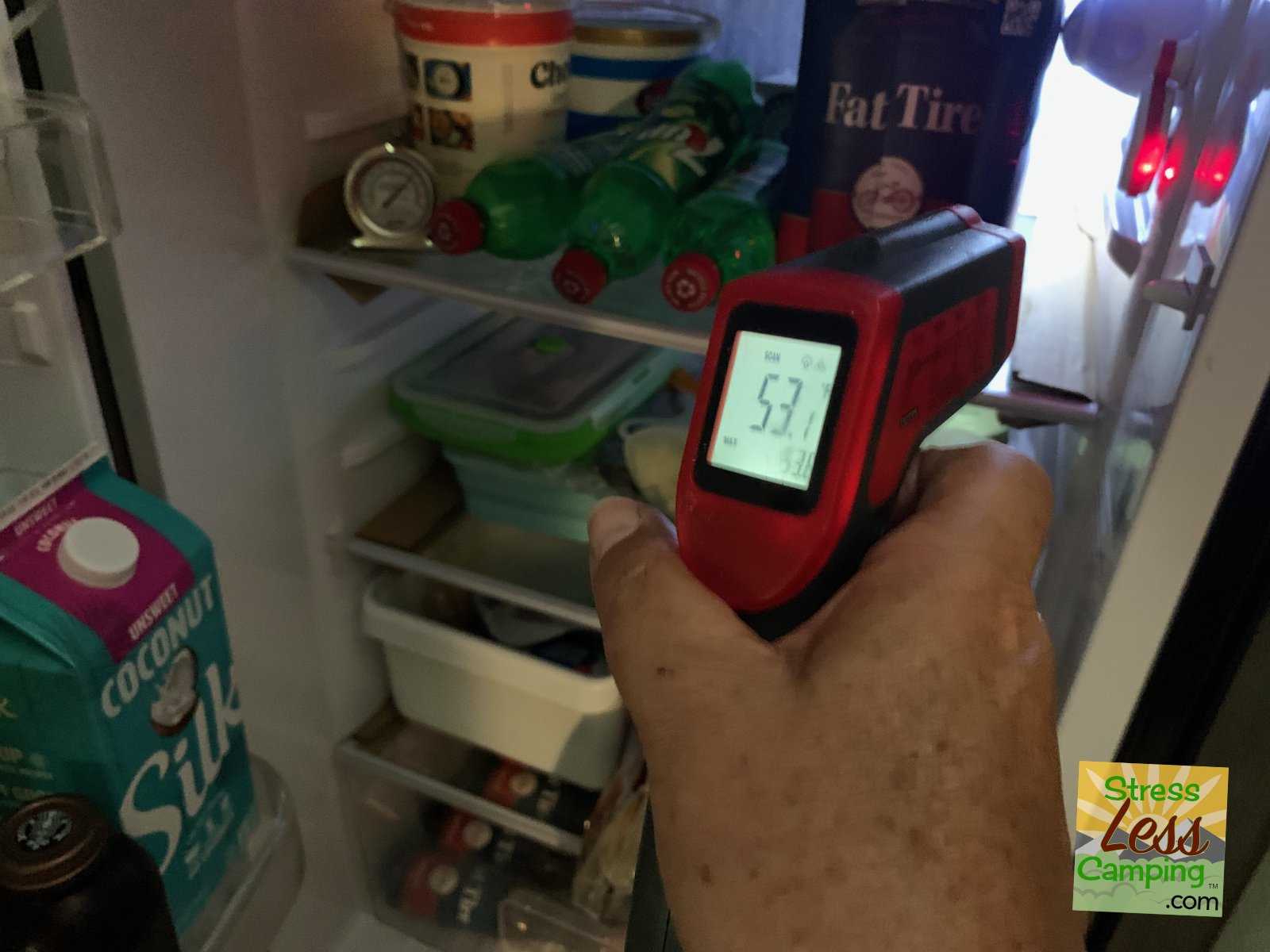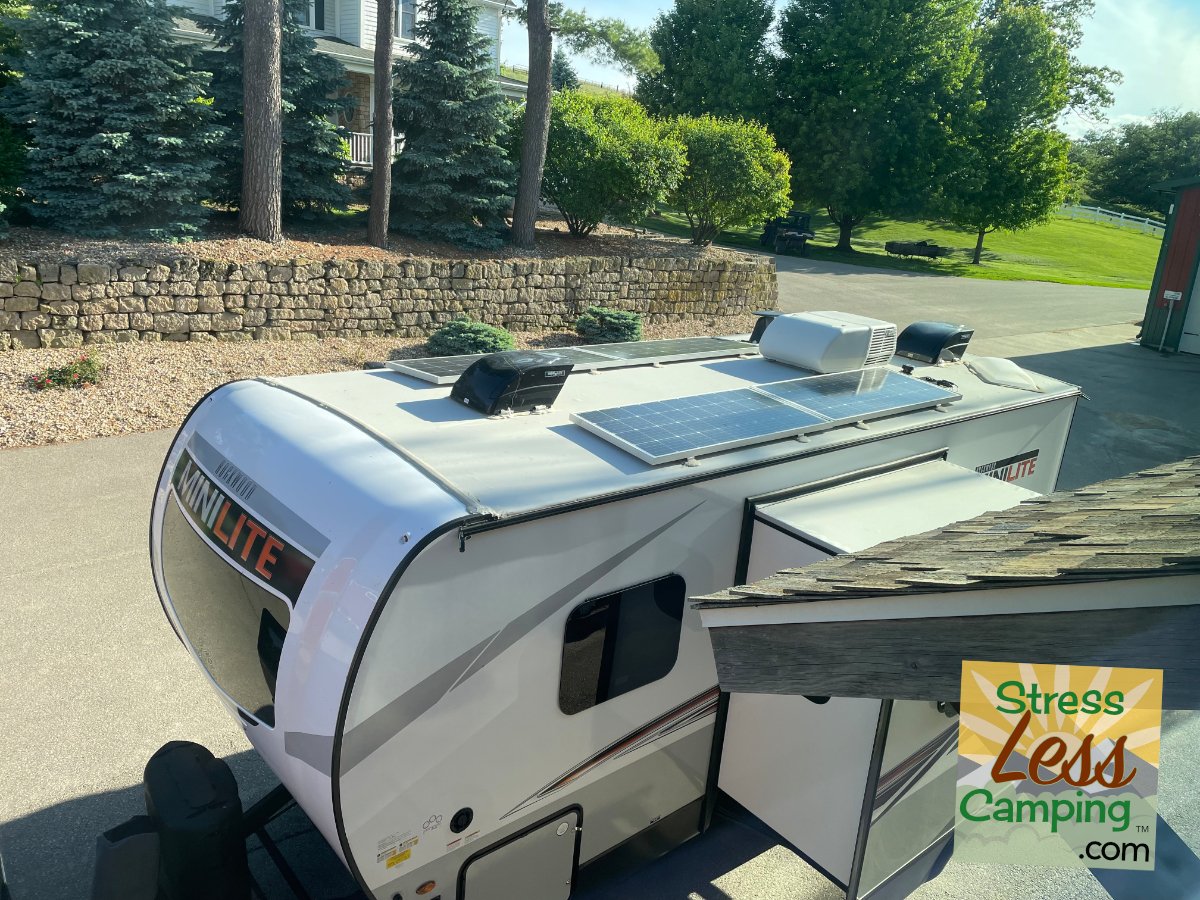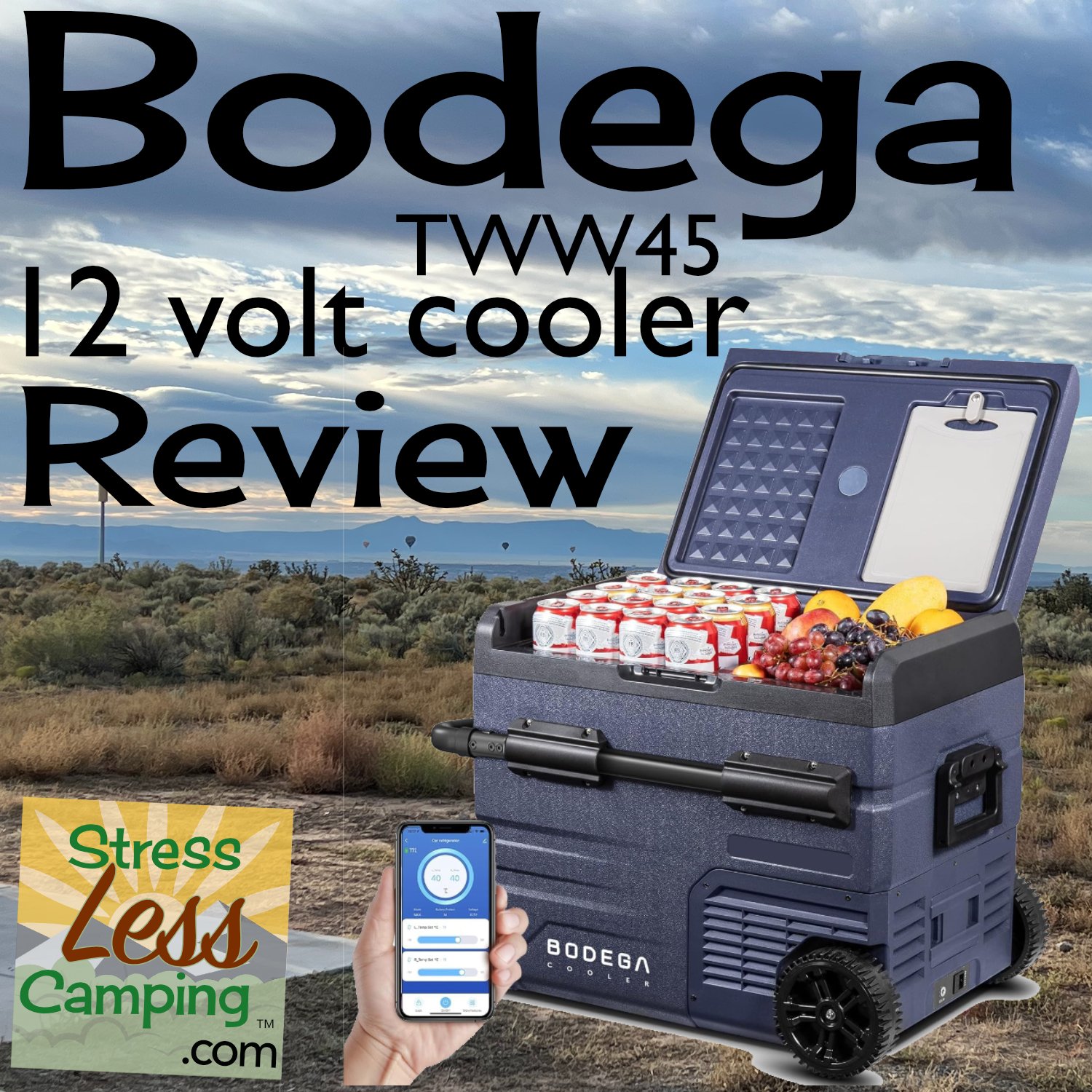RV 12 volt fridges: tips, tricks and challenges
RV 12 volt refrigerator tips
Is a 12 volt RV refrigerator better than the old propane-electric RV refrigerator? And how does the 12 volt fridge compare to having a residential refrigerator in an RV? We get some great questions in the StressLess Camping Podcast Facebook Group including this one, thanks to Larry L. What are the advantages and disadvantages of these types of refrigerators? And what about those three-way refrigerators?
RV 12 volt refrigerators
RV 12 volt fridges are the latest craze in the RV manufacturing space. According to some companies they are a miracle of modern technology that will solve problems of all sorts. Without a doubt these new refrigerators have spurred a demand for roof-top solar panels, with many companies stepping up their solar game.
RV 12 volt refrigerator advantages
What are the advantages of an RV 12 volt refrigerator? RV 12 volt fridges use the same basic technology as the refrigerator in your home. They use a compressor to compress the gases internally which is a faster way to cool down the reefer.
This means that, instead of waiting up to 12 hours for the fridge to cool when it’s been sitting in a storage lot for months, it may only take 1-2 hours depending on the fridge.
There is also no propane going to this fridge. That also means there’s no open flame so, in theory, they’re less likely to start a fire. That also means that there are fewer arguments against letting this refrigerator run while you’re driving down the road.
We’ve published this article about whether you should run your propane-electric fridge while driving.
The 12 volt fridge can also use the electricity provided by the tow vehicle in the case of a towable RV. The tow vehicle could overcome all the power consumed by the fridge while on the road and still leave some power to charge the RV’s battery.
These refrigerators are also much less affected by the weather outside. If it’s humid or dry, cold or very hot, they still manage to keep your ice cream frozen. Oh, and they keep your ice cream frozen, not just really chilly. If you’re lucky.
Since the system that makes them work consumes less space, 12 volt RV refrigerators also tend to have more room for your grub. Typically these occupy the same outer space as a traditional RV refrigerator but more of that size is devoted to food and less to the mechanism that keeps food cold. Bonus.
For example, the typical travel trailer fridge has had about eight cubic feet of storage. A comparably-sized 12 volt model will have ten.
Another advantage of 12 volt RV refrigerators is that they don’t have to be vented to the outside. Propane-electric RV refrigerators require two large vent holes in the outside of an RV. This invites critters and leaks, both of which are undesirable.
Lastly, 12 volt refrigerators aren’t as particular about being perfectly level. The gas absorption refrigerators typically want to be within three degrees of level to operate properly.
A typical gas absorption refrigerator with a battery-powered fan to help the cooling.
Typical RV refrigerators - gas absorption
The refrigerators that many RVs have had in the past are what are called gas absorption refrigerators.
This type of fridge uses heat to heat up a gas mixture. The heated gas will rise, expand, and create the cooling you want in your fridge. The heat to accomplish this comes from either a small propane fire or an electrical heating element. That heating element can be operated on either household current (120 volt) or, in some cases, even 12 volt.
There are effectively no moving parts in these refrigerators, although the gas valving has moving parts if you want to get absolutely technical.
Since propane has so much energy (did you know that a 20 pound bottle of propane has about the same energy as 100 100 amp-hour lithium batteries!?) using propane to operate your RV refrigerator is extremely efficient. Further, these systems really sip propane.
As a result gas absorption refrigerators are great for boondocking because they consume such a small amount of the resources you have in your RV. In other words, even a small tank of propane can last for a week or more depending on circumstances.
RV fridge disadvantages
Of course there are disadvantages of the gas absorption-style RV refrigerator. It takes a long time to cool simply because there is no moving air in the fridge. It works similarly to putting a single block of ice in the fridge.
You can improve this with an RV refrigerator fan.
Measuring temperatures inside our GE 12 volt fridges.
There is also the reality that you may have a small propane fire burning to heat up the gas in the fridge. Any fire, even one controlled by a system, has the potential to get out of hand. This is particularly true if you don’t periodically open the vents in the back of these refrigerators and make sure they’re clean.
The smell of propane attracts some insects and the nice, warm space may also attract birds. I have seen bird nests and twigs in the vents. Plus, a propane fire can mean trouble.
The heating process is much more effective with propane than with either household power or 12 volt. The hotter propane fire simply creates better fridge cooling, but having the ability to operate an RV fridge with household current is convenient.
Another disadvantage of gas absorption refrigerators is that there is no provision to defrost them, so they can build up rather impressive blocks of ice near the cooling element.
Lastly, since the gas absorption refrigerator uses thermal convection to operate, it is fairly critical that it is level when operating. Typically these fridges want to be within about three degrees of level or problems can arise, including the failure of the fridge altogether.
Power consumption of 12 volt refrigerators
One of the biggest surprises of 12 volt RV refrigerators is how much energy they consume. While we’ve been sold on the idea that a good RV battery, such as a lithium battery, can operate an 12 volt fridge for days, this is generally not true at all.
In fact a 12 volt RV refrigerator all by itself can go through all the energy in a single lithium battery in fewer than 24 hours.
This is not an issue if you have a decent way to refill the battery. But if you’re hoping the battery reserves alone will keep the beer cold, you might be in for a surprise. Further, don’t forget that other systems in the RV may also be drawing on the power in that battery.
We have an article about what is using electricity in your RV here.
Of course having solar on your RV can compensate for the consumption of these refrigerators by keeping your battery full. So, too, can a generator - you can add power back into the battery and be fine.
Rather than rehash the outstanding work that my friend Mike Sokol has done about power consumption in these refrigerators, there are links at the end of this article to very detailed information he has put together.
This might seem like common sense, but know that these 12 volt fridges use more power when the weather’s warmer just because they have to keep your milk cold. Coincidentally, warmer weather often means better performance if you have a solar system so there’s that.
Not all 12 volt refrigerators are the same
I am rather concerned that a lot of people will lump all 12 volt RV refrigerators into one pile.
Just like with residential refrigerators, 12 volt refrigerators can vary significantly in features and quality as well as job performance and energy consumption.
For example, the GE 12 volt refrigerator that I’m seeing in more and more RVs is actually one of the worst of the breed from my experience. The door latch is very poorly designed. It freezes food at the back while barely keeping food at the front at food-safe temperature. There is no internal fan and the compressor only has one speed.
But, as 12 volt refrigerators go, it’s relatively cheap and easy to come by so RV companies are buying them left and right.
We replaced the GE fridge with a Dometic DMC4101 refrigerator. It was a vastly better experience.
The Dometic 12 volt fridge features mechanical latches for the doors, a multi-speed compressor, fan inside, digital controls and other features. It was more efficient, quieter, and better in every way the the GE fridge we replaced. If I had only experienced the GE model, I wouldn’t be a big fan of 12 volt refrigerators in RVs.
And there are other brands, too, including Furrion and Norcold, both traditional builders of RV components. Further, Vitrifrigo is an Italian maker of these things which are the Cadillac, er, Ferrari of the lot as well as an originator. This brand is more focused on the marine market but makes a great product.
Further, now there are larger 12 volt RV refrigerators hitting the market with fancy features like digital displays on the outside and finishes that make them fit well in high-end RVs.
RV-specific 12 volt refrigerators are also designed for the mobile world. Things are ruggedized with mounting for compressors and other parts that are, according to what I’m told by the industry, designed to withstand the roads we suffer in these United States.
Residential refrigerators
Since the basic function of a 12 volt RV refrigerator is the same as a residential refrigerator, why not use that instead?
Very simply put household refrigerators only operate on household current, 120 volts. If you are camping off the grid you have to come up with this power somehow. Of course the easy way is with an inverter, but this means another system and further losses.
Also, having worked in the warranty department at an RV dealership, I can tell you that many appliance repair people simply will not work on a residential refrigerator if it’s in an RV. Further, many RV repair people don’t have the provisions to work on a residential refrigerator.
And, many residential refrigerators have such large cabinets that the only way to get a busted one out of an RV is either remove a windshield or even an entire slide room. That, my friends, is neither inexpensive nor quick.
In summary
If you’re looking at a new RV I do like the 12 volt refrigerators for a lot of reasons. Aside from the GE model, their cooling performance is really good. They do consume a fair amount of power but you can compensate for this with solar panels or a generator or simply driving down the road and using your vehicle’s charging system.
You get more interior space for a given cabinet size and there is no need for holes to be cut into the side of your RV for venting.
Additional resources including articles by Mike Sokol
Mike’s impressions of the Dometic DMC 4101 RV refrigerator: read article
Mike’s explanation of the Danfoss compressor technology: read article
Mike Sokol’s article on Updates on Hughes Autoformer, Dometic 12-volt fridge, SoftStartRV on a solar panel
Mike Sokol’s article (part of a series) on boondocking power requirements: read article
Mike Sokol’s article on how much power you need to operate RV appliances: read article
Podcast episode: new RV refrigerator trends with Josh the RV Nerd

